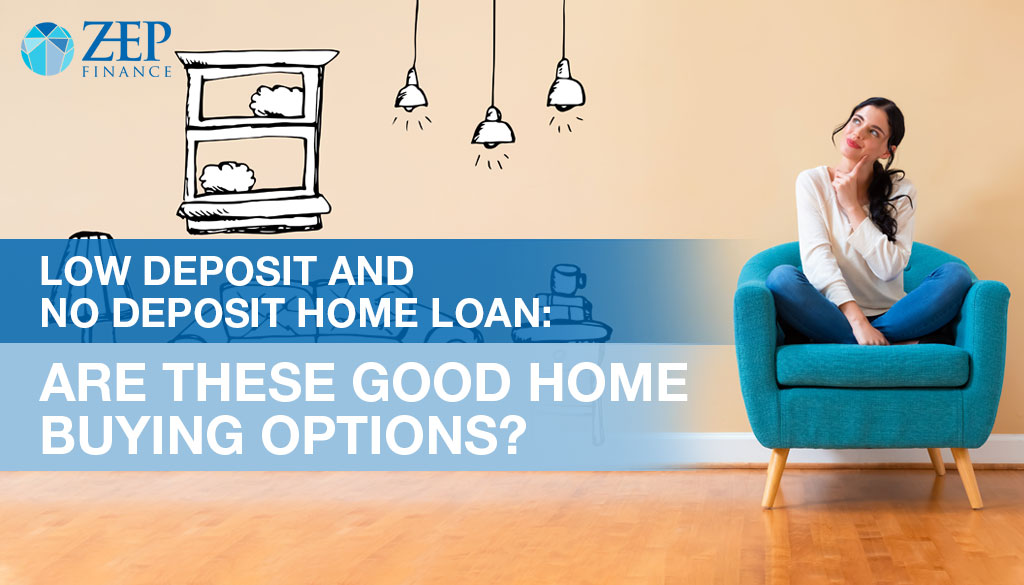Buying a house with no deposit? Seems rather impossible, doesn’t it? Well, if you’re tired of being told that you can’t get a low deposit or no deposit home loan, this blog post is for you! Because guess what: it actually IS possible to secure a home loan with no deposit!
In this blog, we’ll show you how to climb the property ladder without breaking the bank. We’ll explore:
- How to get a home loan with no deposit.
- How Lenders Mortgage Insurance applies to low deposit home loans.
- The different no and low deposit home loans available to borrowers.
- The government incentives available to help first home buyers with minimal deposits saved.
Can You Apply for a Home Loan With No Deposit?
First home buyers will often hear that the minimum deposit typically required for a home loan ranges from 5% to 20% of the property’s value. However, several factors influence the exact amount, including the type of loan, the lender requirements, your eligibility for government schemes and your current financial situation.
For example, some government programs allow eligible first home buyers to purchase a property with a deposit as low as 5%. There are also speciality home loans available to people working in certain industries (such as the medical or legal profession), which may allow eligible borrowers to secure low deposit home loans.
So, why do people always say you’ll need a 20% deposit? Because most lenders will charge Lenders Mortgage Insurance (LMI) on home loans that have a deposit of less than 20%.
Lenders Mortgage Insurance and a No Deposit Home Loan
Lenders Mortgage Insurance is an insurance product designed to protect lenders in the event a borrower defaults on their home loan and the property can’t be sold for a high enough price to cover the outstanding loan balance. That’s why it’s usually required for loans with a deposit of less than 20%, as these kinds of loans are considered riskier for lenders.
LMI is typically a one-off premium paid by the borrower, either upfront or added to the loan amount. The total cost of LMI will vary depending on factors such as the loan amount, the loan-to-value ratio (LVR) and the lender’s specific policies.
Do Low Deposit Home Loans Cost Extra?
The cost of LMI can range from a few thousand dollars to tens of thousands, depending on the level of risk perceived by the insurer.
For example, let’s say you want to buy a property valued at $500,000. So far, you’ve saved up $40,000 for a deposit, which is 8% of the property’s value. Since your deposit is less than 20%, your lender requires you to pay LMI. Based on your specific circumstances, the LMI premium is around $10,000. At this stage, you can choose to pay this amount upfront (which will further decrease the size of your savings) or you can add it to your loan amount, increasing the total loan (which will result in you being charged interest on the cost of the LMI throughout the life of the loan).
In this scenario, LMI provides protection to your lender in case you default on your loan. While it enables you to purchase a property with a smaller deposit (making homeownership more accessible), it also adds to the total cost. That’s why it’s important for you to consider the additional cost of LMI when calculating your overall borrowing expenses.
How to Get a Home Loan With No Deposit or a Low Deposit

Fortunately, there are ways for borrowers to secure a low or even no deposit home loan. These include the following options:
1. Guarantor Loans
A guarantor loan is offered by lenders to borrowers with a deposit of less than 20%. In this situation, the guarantor offers some of their own property equity as a guarantee of the borrower’s capacity to service the loan.
The guarantor acts as a third party who agrees to pay back the mortgage should the borrower default or become unable to pay. They can be your parents, family, spouse or anyone deemed eligible as per the lender’s criteria.
2. Leveraging Your Equity from Another Property
If you already have a home and are planning to buy a second property, then buying a house with no cash deposit may be possible by accessing the equity in your first home. This serves as a deposit for a new property purchase, effectively using your current property as collateral for the new loan.
This is known as an “equity loan” or “equity release.” It can be done by refinancing your current home loan or by taking out a separate loan, known as a “line of credit” or “home equity loan.” This allows you to borrow against the equity in your home.
3. First Home Guarantee Scheme
This government grant (formerly known as the First Home Loan Deposit Scheme) allows eligible first home buyers to purchase a home with a deposit as low as 5% of the property’s value. The government provides a guarantee for the remaining deposit. Eligible buyers can purchase a home without having to save a large deposit and pay for Lenders Mortgage Insurance.
The First Home Guarantee scheme is only available for the purchase of new properties, and there are restrictions on the price of the property, which varies depending on the location. There are also income limits for the scheme, so not all buyers will be eligible.
4. Family Home Guarantee Scheme
Under the Family Home Guarantee Scheme, eligible first home buyers who are single parents with at least one dependent child can purchase an established or newly constructed (but not yet occupied) home with as little as a 2% deposit. Applicants must be earning less than $125,000 a year and can’t have ownership of any other property at the time of application.
5. Professional Home Loans
Some professionals may be eligible for 90% LVR home loans including, but not limited to:
- Doctors
- Medical professionals
- Accountants
- Lawyers
- Financial planners
These professionals are considered low-risk borrowers by some lenders, and also have one of the lowest default rates among borrowers. They can enjoy the perk of borrowing up to 90% of the property price without paying Lenders Mortgage Insurance.
It is best to check with specific lenders to see if they offer a no deposit home loan and if you meet their requirements. Alternatively, you can talk to a mortgage broker who has access to these types of lenders and get them to process an application on your behalf.
Can You Use Super to Buy a House With No Deposit?

It is possible to use your superannuation (retirement savings) to buy a house, but it is not a straightforward process.
One way to do this is through the First Home Super Saver Scheme (FHSSS). This allows eligible first home buyers to withdraw voluntary contributions they have made to their super fund to use as a deposit for a first home. However, certain conditions apply, such as the requirement to live in the property for at least 6 months within the first 12 months of ownership.
Talk to ZEP Finance About a No Deposit Home Loan
Getting a loan for a home can be a struggle. Let ZEP Finance help.
Despite what others may tell you, it is possible to get a low or no deposit home loan, although it may be more challenging than obtaining a traditional home loan with a larger deposit.
If you’re having trouble finding the right loan, don’t hesitate to call our mortgage brokers! At ZEP Finance, we have an outstanding range of lenders available, and we will help you with everything — from paperwork through to settlement.

After studying business and finance at university, Zain initially expected to pursue a career in finance. However, his passion for property and the experience of buying his own home led him to mortgage broking. He began his mortgage brokering career in 2009 and founded ZEP Finance in 2010.








